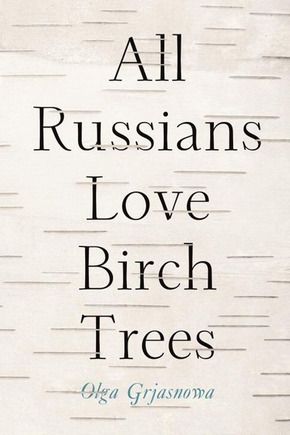
All Russians Love Birch Trees
| Verlag | Random House US |
| Auflage | 2014 |
| Seiten | 330 |
| Format | 13,3 x 20,6 x 2,2 cm |
| Gewicht | 392 g |
| Artikeltyp | Englisches Buch |
| ISBN-10 | 1590515846 |
| EAN | 9781590515846 |
| Bestell-Nr | 59051584UA |
An incisive, post-nationalist, debut novel by one of Germany's hottest young writers.
Klappentext:
Set in Frankfurt, All Russians Love Birch Trees follows a young immigrant named Masha. Fluent in five languages and able to get by in several others, Masha lives with her boyfriend, Elias. Her best friends are Muslims struggling to obtain residence permits and her parents rarely leave the house except to compare gas prices. Masha has nearly completed her studies to become an interpreter, when suddenly Elias is hospitalised after a serious soccer injury and dies, forcing her to question a past that has haunted her for years.
Leseprobe:
Back in the day, when my mother was still young, gorgeous, and successful, and before she married my father on a whim, our living room had held a grand piano. Preparing for a performance, my mother would practice for days on end. Because of hygienic concerns and the general situation, I'd gone to kindergarten only for a few weeks. Instead, I'd stayed in the living room, sitting under the grand piano and listening to my mother play.
Whenever I saw my parents now, I always assured them that I was fine. I talked about my stipends, summer academies, internships, and stays abroad. I told them about my plans: where I would work and how much I would earn. I told them about Sami and then about Elias, and my parents believed every single word because I played my role well. When we got around to the meat dish, lamb with steamed chestnuts, dried fruit and dolma (those vine leaves stuffed with rice, round lamb, finely minced onions, and nuts), my mother laughed. I told her hospital anecdotesthat I made up as I went along.
She finally left, leaving behind pomegranates, oranges, pears, bananas, stuffed puff pastry, and the last piece of chocolate cake. I turned on the TV. A rerun episode of Tatort flickered across the screen. In Hannover all signs pointed toward the detective soon spending a hot night with a Southern European. I cranked up the volume and went off to take a shower. I thoroughly scrubbed away dead skin cells and the faint smell of hospital. I tried to recall Elias's body without the screws and the long scar on his thigh. Then I imagined kissing a woman in the staircase, in the midst of banging doors, cooking smells, and screaming children, and how I would slip my hands between her thighs. I was back on the couch, putting cream on my legs before the murderer was caught. I had a suspicion and awaited the solution.
